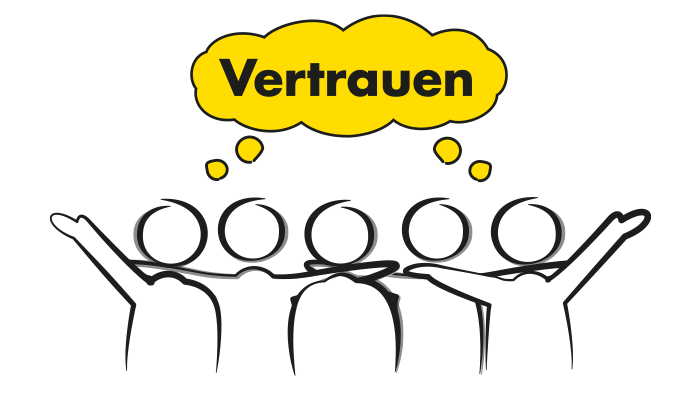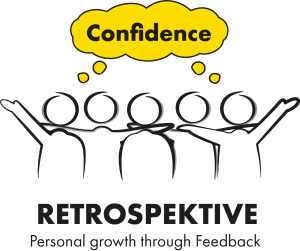
Opportunity for trust building.

When asked: “What was the most important reason for the success of your best project?” most people answer: “The trust in the team”. If that is really the case, then you have to ask yourself: How can we specifically ensure that trust is created? The answer is: create opportunities where trust can take place. A specific reason is the implementation of a one-hour retrospective every two weeks at the end of a sprint, moderated by AGILECOACH.
The tension rises – retro as a valve.
AGILE creates a higher commitment to a sprint result. This means that people in a team are more exposed to expectations than before. This creates a high level of pressure between each other to succeed, which can lead to tensions that can sometimes erupt verbally. Retro offers an outlet for these tensions: Here they are recognized and addressed in order to find solutions. In the best case scenario, misunderstandings are uncovered that can be quickly and easily cleared up, but which previously would have taken on a life of their own.

Feedback – a sensitive topic.
Feedback is the expression of positive and negative aspects about a current or recently completed situation: What was good, what was bad? In development environments, it is particularly common to find people with scientific training. These people are often particularly rational, logical, very precise and rather critical. The more pronounced criticism orientation can lead to extreme top performance in technologically highly complex tasks. In the best case scenario, products with the highest performance and unique selling points are created with unassailable competitive situations. People structured in this way can easily get caught up in negative loops and rob each other of lasting energy. Then feedback is extremely dangerous! It can be taken personally and hurtful. Regular feedback meetings are important. But they can also become a minefield, which is why they should not be underestimated.
Simple feedback rules:
Start with something positive. Starting conditioning is the most important. Begin with a warm-up exercise that promotes awareness of positive aspects. Start with the team member who radiates the most positive energy.
Feedback meeting phases. What you may know from entire projects also applies to individual meetings: It goes through four phases: 1. Norming, 2. Forming, 3. Storming and 4. Performing. If you are aware that the critical storming phase is followed by the performing phase, you can remain more confident. You just have to wait and see.
Shift abscissa. Mentally divide all aspects into positive and negative. If you place the abscissa (x-axis) in between, you can move the zero line downwards. Then there are no longer “negative” and “positive”, but only “positive” and “double positive”. I think changing the direction of perspective is crucial. Because what is the point of discussing a negative aspect? Most of the time, consciously or unconsciously, it leads to the search for someone to blame. This leads to distance and risk of injury. Do you think that would be repression? This will catch up with us anyway? Try it. Focusing attention on constructive solutions will help you move forward more easily.

Mindfulness training: »What would I like to thank you for?
The question “What do I want to thank you for?” is so different. For many people, it is unusual to think about this question, even if they have worked with some colleagues for a long time and have spent more time together than with their spouse. But everyone finds an answer after a moment of silence. Being able to formulate and express these is another two steps. If this team feedback takes place every two weeks, a training effect is created that can lead to increasing ability to build trust. Teams “bond” together.
1. In retro, team members enable themselves to look at the people they work with more intensively and to perceive them more mindfully.
2. If you focus mentally on the people you worked with in the last sprint, you will always find something positive in their actions. These positive memories are brought forward and anchored. Positive experiences with people strengthen relationships and generate positive energy.
3. The ability to formulate positive aspects and communicate them regularly to third parties means that this is not just applied in this one hour every two weeks in the retro. People are finding it increasingly easier to give recognition. Those who give more recognition receive more of it themselves. If this exercise seems a bit artificial at the beginning, that’s not a problem. Even somewhat awkwardly worded praise has a positive effect, provided it is genuine.

How does this work?
 The background to this effect has been scientifically studied: those who give more recognition receive more of it themselves. The task of the AGILECOACH is to bring the team members closer together in a methodically and humane manner, knowing about these connections. The result is a relationship that can bind a team together. Team feedback causes people to become more attentive and pay more attention to each other. They develop more mindfulness for each other and thus the ability to perceive and express feelings better. For many people, the energy that arises from authentic recognition in the team is worth more than money or the company’s magnificent infrastructure.
The background to this effect has been scientifically studied: those who give more recognition receive more of it themselves. The task of the AGILECOACH is to bring the team members closer together in a methodically and humane manner, knowing about these connections. The result is a relationship that can bind a team together. Team feedback causes people to become more attentive and pay more attention to each other. They develop more mindfulness for each other and thus the ability to perceive and express feelings better. For many people, the energy that arises from authentic recognition in the team is worth more than money or the company’s magnificent infrastructure.

Process review.
The second feedback block is the process review. This is about the team remembering how they have worked over the last two weeks. Which processes accelerated development progress or improved product quality? We receive truly inspiring answers from the teams to the questions: “What did you do without paying attention to the existing processes?”, perhaps even: “How did you consciously work around the processes?” Do you know the effect of submarine projects? At one company it was called the “cleaning rag project”: When the boss came, the cleaning rag was placed over the product sample in the sample building to hide it. Projects that do not bear the burden of being commissioned by management, but are wanted by the team, receive the highest attention. Why?
Because the energy of the illicit has a special appeal.
You can use this effect positively: people who enter new territory are wide awake. People who obediently work according to predefined processes rarely achieve innovative top performance. Leadership that allows teams to consciously override rules is the most motivating. Teams that go off the beaten track are more focused and take on a high degree of personal responsibility. Mature leadership is therefore more likely to accept an apology than to give permission in advance.
It’s better to ask for an apology than for permission.
The risk is limited: Retro runs a lessons-learned workshop every two weeks. Errors can be corrected. In addition, the process is improved a little every two weeks. It is better to take frequent, real and small steps than a few large ones that are not implemented. Teams that constantly optimize themselves and take their actions into their own hands gradually become high-performance teams.